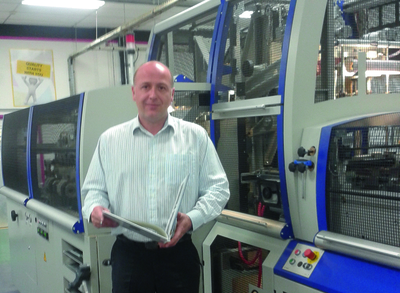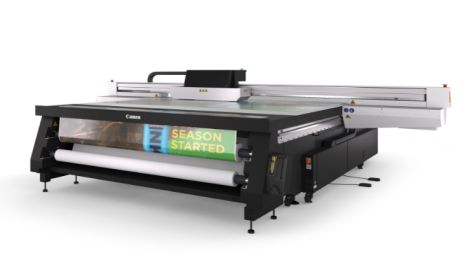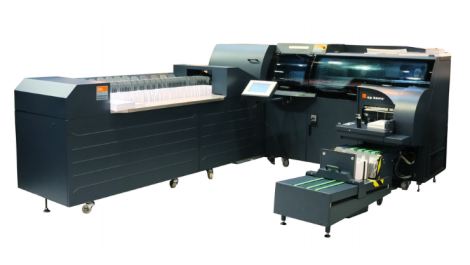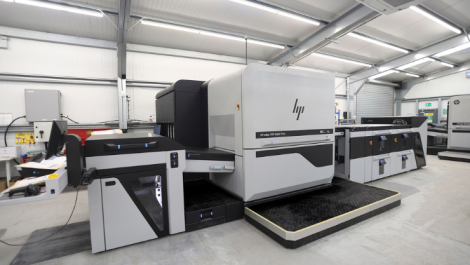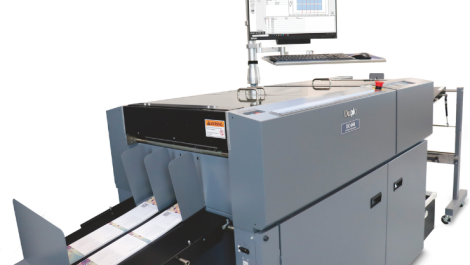James Belton with Kolbus installation at Harrier LLC
Harrier’s factory in Newton Abbott is the site of the UK’s largest array of HP Indigo presses, and they are not always stacked out with work. Whether for photobooks or general commercial work, the invitation is there to take advantage.
It is late afternoon in mid-October, and Harrier LLC’s fleet of eight HP Indigo presses are becalmed, each machine standing alone as if wrapped up in its own thoughts, not an operator in sight.
The extent of the technology on show, and the comparative lack of human beings around, is slightly disconcerting. How, you can’t help but wonder, does this company make any money? There are other times of the year when such a thought could not be farther away.
The Devon company’s 170 full time staff will be augmented by as many as 300 part time workers, all helping to meet the seasonal rush for Harrier’s core photo products, including photobooks. To put this into perspective, Harrier does 60% of its annual sales in just six weeks. It is the biggest photo wholesaler in the UK, with around 75% of its work being through commercial partnerships with companies such as Snapfish, Tesco, M&S and Funky Pigeon.
Such a rhythm requires what many would see as overkill in terms of capacity, but Harrier simply cannot afford not to meet these vastly increased demands when they arrive with events such as Christmas, New Year and Valentine’s Day; therefore redundancy – at least two of everything – is built into its psyche. It is a company that is built for big deeds, but for much of the year its resource has been going largely untapped.
Julian Marsh, the man behind Prometheus – a photobook business that soared high quickly and seemed to falter with equal alacrity in the recession – is making it his mission to fill this spare capacity. The reasoning sounds solid: there must be many commercial print companies that would love to own an HP Indigo and offer such high quality digital output to their customers; there must be many that aspire to crack the photobook market. The reason they do not or cannot is that the start-up costs required are out of reach.
If such costs can be negated by making spare HP Indigo capacity available as a trade service for general commercial printers that want to offer a high quality digital service, or a high quality photobook service from a standing start, then there could be winners on all sides.
‘We talk about big photo and little photo,’ said Mr Marsh. ‘There are some massive companies doing photo products, while little photo is all the little pretenders doing 500 books per year. We can produce those books for them. Lots of people in commercial print have gone into photobooks and got lost. They are still being told lies by the big companies about the opportunity, but they can see that there’s a lot of cost involved and they cannot make the maths work out.
‘We’ve built an API that means companies can just feed work in. For a small fee, we will brand it, do the website, and handle production, and all they have got to do is the marketing. It will allow them to make some money out of it. If they have a runaway success they can invest in kit later.’
While driving the growth of the ‘little photo’ business was Mr Marsh’s original objective at Harrier, he also saw potential in attracting general commercial print. With little proper planning, he quickly built this into a £20,000 to £30,000 per month contribution and the penny dropped. A proper business plan was put together, and in less than two years Harrier is now doing £200,000 per month of trade commercial print.
The efficiency with which Harrier can produce short run books has also just taken a leap, through its investment in fully automatic Kolbus DA 260 case-making and BF 512 casing-in machines, operating at up to 30 books per minute. It is, Mr Marsh points out, the kind of machine that only the biggest book producers in the land would own.
The Kolbus line has only been in since August and has been given a robust workout already. ‘It’s phenomenal compared to our previous manual case maker,’ he said. ‘The Kolbus takes one person to load and one person to unload, and it can do ten times the volume of the manual machine. We can make cases for pennies whereas before it was pounds.’
As with the UK’s largest fleet of HP Indigos, the Kolbus stands ready to devour your short run requirements.
